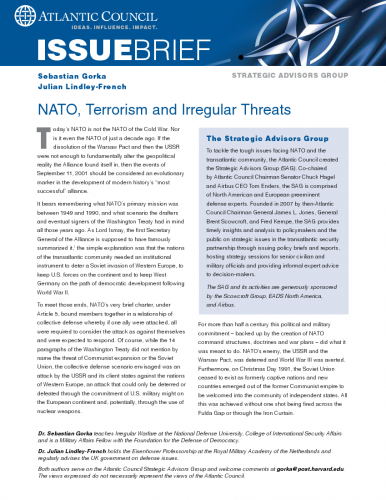In the latest Issue Brief, Strategic Advisors Group (SAG) members Sebastian Gorka and Julian Lindley-French discuss NATO’s role in 21st Century warfare as it moves to address non-traditional threats.

Today’s NATO is not the NATO of the Cold War. Nor is it even the NATO of just a decade ago. If the dissolution of the Warsaw Pact and then the USSR were not enough to fundamentally alter the geopolitical reality the Alliance found itself in, then the events of September 11, 2001 should be considered an evolutionarymarker in the development of modern history’s “most successful” alliance.
It bears remembering what NATO’s primary mission was between 1949 and 1990, and what scenario the drafters and eventual signers of the Washington Treaty had in mind all those years ago. As Lord Ismay, the first Secretary General of the Alliance is supposed to have famously summarized it, the simple explanation was that the nations of the transatlantic community needed an institutional instrument to deter a Soviet invasion of Western Europe, to keep U.S. forces on the continent and to keep West Germany on the path of democratic development following World War II.
The New Threat
Clearly there are nations who do not share the political and moral values of NATO’s member states. The variety among them is great, from mid-sized quasi-dictatorships in Europe, such as Belarus, to island states in the Caribbean, such as Cuba, to gargantuan powerhouses such as the People’s Republic of China. None of these poses a conventional military threat to NATO. Whether they pose unconventional
challenges is another matter entirely. In a world of deeply interconnected financial markets and national infrastructures controlled almost exclusively by privately owned information technology networks, it is not tank regiments on the border that provide the first sign of impending attack to one’s national interests. To make matters even more complicated, the Alliance can no longer afford the luxury of focusing its threat assessments solely upon nations, or groups of nations.
Strategic Advisors Group:
To tackle the tough issues facing NATO and the transatlantic community, the Atlantic Council created the Strategic Advisors Group (SAG). Co-chaired by Atlantic Council Chairman Senator Chuck Hagel and Airbus CEO Tom Enders, the SAG is comprised of North American and European preeminent defense experts. Founded in 2007 by then-Atlantic Council Chairman General James L. Jones, General Brent Scowcroft, and former Norwegian Minister of Defense Kristin Krohn Devold, the SAG provides timely insights and analysis to policymakers and the public on strategic issues in the transatlantic security partnership through issuing policy briefs and reports, hosting strategy sessions for senior civilian and military officials, and providing informal expert advice to decision-makers.
Recent Atlantic Council NATO Publications:
- STRATCON 2010: An Alliance for a Global Century
- Afghanistan, Pakistan and NATO’s Strategic Concept
- NATO Defense Capabilities: A Guide for Action
- NATO Initiatives for an Era of Global Competition
- NATO’s Nuclear Policy in 2010
- NATO Reform and Decision-Making
- Article 5 and Strategic Reassurance
- The U.S., NATO and the EU: Partnership in the Balance
- The Challenge: NATO Amidst Geopolitical Realities
- A New Transatlantic Compact for NATO
The SAG and its activities are generously sponsored by the Scowcroft Group, EADS North America, and Airbus.
